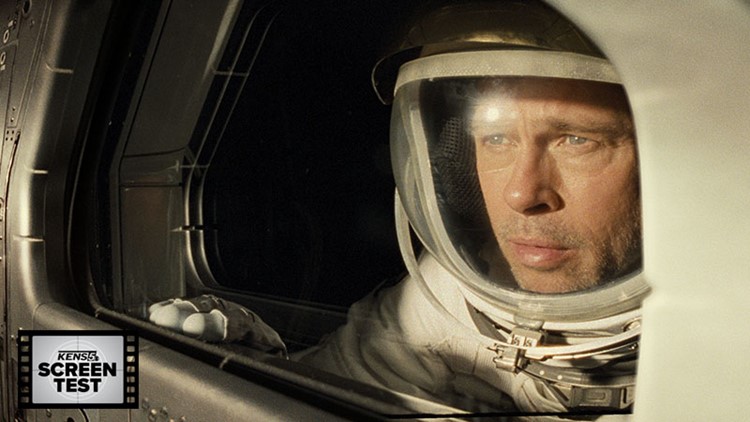To strap into the vessel through which writer-director James Gray chooses to explore the cosmos in the meditative “Ad Astra” is to understand the emotional turmoil endured by the astronaut we're accompanying, Brad Pitt’s Roy McBride.
Despite its opening notes and frames being injected with a just sense of grandiosity that we’ve come to expect from modern space movies, Gray’s latest film is just as much an introspective journey as it is an intersteller one. The premise is straightforward – astronaut must travel through space and communicate with his long-thought-dead father, who may have a role in ongoing Earthly catastrophic phenomena – but this space odyssey is contemplation and adventure in equal measure, guided by one of the year’s most effectively somber performances and a startling level of self-awareness on Grey’s part about Hollywood’s historical teachings on the isolation of intergalactic exploration.
The "Lost City of Z" and "We Own the Night" director also offers up a counter-argument to our perhaps-overzealous ambitions of reaching the stars as a pinnacle of human achievement, one we should have been considering all this time: Why should we expect humanity’s problems to be bound to Earth?
The personal stakes that sparks Roy’s mission ensures the screenplay – co-written by Gray and Ethan Gross – is just as invested in skipping through the remnants of fractured relationships as it is through the stars. “It’s a time of hope and conflict” in the near-future setting that “Ad Astra” unfolds in, subtitles tell us early on, before Pitt’s narration envelops us into the crevices of a mind that is bare of emotion, albeit tactically so.
Films and history – sometimes the fusion of the two – have taught us there is barely an inch of room for error while operating above our atmosphere. When it comes to Roy, whose pulse a superior impressively notes has never surpassed 80 bpm while in situations we couldn’t fathom, being able to deplete himself of emotion and remain laser-focused on his duties is why he doesn’t crack while hurtling miles to the ground in one early, terrifying sequence that feels at once entirely implausible and wholly engrossing.
It’s also allowed him to adequately follow in his father’s footsteps; a portrait of Tommy Lee Jones’s Clifford McBride, with the face of stoic nobility we ascribe to our historical heroes, hangs beside Buzz Aldrin’s in the halls of Space Command, telling us all we need to know about his legacy.
But Roy’s unencumbered precision at burying the emotions that could betray him in space (something Damien Chazelle's "First Man" also explored) seeps into his life outside Space Command. Early scenes of Liv Tyler as a nameless, presumed significant other are more like spectral mirages occasionally forming in the desert of his mind. And, if you listen closely to Roy’s joyless monologues, Gray provides hints that astronaut son and astronaut father didn’t leave things off in the best of terms before Clifford apparently died decades ago, while venturing further than any human has before.
While I expect many who watch “Ad Astra” to be confused and perhaps a bit-blindsided by the ostensible lack of gravitas in Pitt’s delivery of Roy’s struggles – and these musings are consistent throughout a film with occasional space shootouts and skirmishes that never betray its priority as a character study – I found, perhaps ironically, great depths of vulnerability in it. There’s a staunch loneliness Pitt is able to manifest, largely orally, in Roy's inability to reconcile his words with the confusion and sorrow that fuels them; the deeper we venture with him into the deep blacks and blues of space, the more jarring it is when there is a burst of rage or yearning seeping through the surface. For how immense space is known to be, it still can’t quite contain the depth of human emotion, nor the expectation of legacy, despite Roy’s best efforts.
At some point in our cultural, and pop cultural, history, the speckled expanse carrying on endlessly above us came to be synonymous with ambition and fantasy-made-reality, the conquering of it not as much eventual as it is inevitable—a justification of our years of advancement on Earth and a marker for what can be accomplished when we look past our earthly squabbles.
Gray puts us in our place and our expectations in check, imagining a future that is honest in its nihilism, in which Elon Musk’s dreams of building cities on Mars are realized with all the griminess of what continues to plague us in 2019—corporate and military secrecy, and corruption, and commercialism.
“Ad Astra” spends very little time on the Earth we know so well, but the more the movie goes on we almost have to remind ourselves of where Roy is not; all of our social strata has stretched to the stars, painting a world directly countering the optimism that tilts our chins skyward, and soundtracked by a hauntingly intimate Max Richter score mimicking spectral countdowns and ill-fated journeys.
It’s all painted against some of the most stunning imagery of 2019. Even in the universal intimacy and stripped-down grandeur of Gray’s aesthetic, he has undoubtedly made a movie for the big screen. Big-budget effects isn’t the thing that justifies the theme-heavy “Ad Astra” as a movie – a welcome thing in the age of CGI overkill – and I found myself wondering if Gray is suggesting an indictment against space movies themselves. Which stories are we neglecting to tell by searching for humanity in the cinematic cosmos? What, or who, are we overlooking that's right in front of us?
If there’s a weakness to “Ad Astra” it’s that the movie could be too centered on its protagonist. The film doesn’t have female characters so much as use women as sharpening stones for Gray's story, reducing Tyler to a prop and relegating the excellent Ruth Negga, whose connection to Roy momentarily suggests she will join him to the end of his journey, as a shepherd between story beats.
These aren’t filmmaking errors so much as tangible choices by Gray, who has created such a genuine-feeling work of film with a sky-high level of craft that is also irked by legitimate anxieties about our ambitions. If “Ad Astra” is totally sure of one thing, it’s that it firmly knows its place in the canon of space-centered movie and TV fare that has been constructed up to this point. Space may be the final frontier, but Grey’s sympathies are Earthbound.
"Ad Astra" is rated PG-13 for violence, some of it bloody, and the occasional strong language associated with moody existentialist pondering
Starring: Brad Pitt, Liv Tyler, Ruth Negga, Tommy Lee Jones
Directed by James Gray



